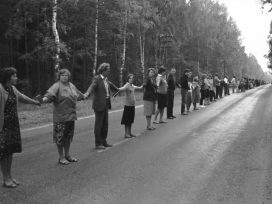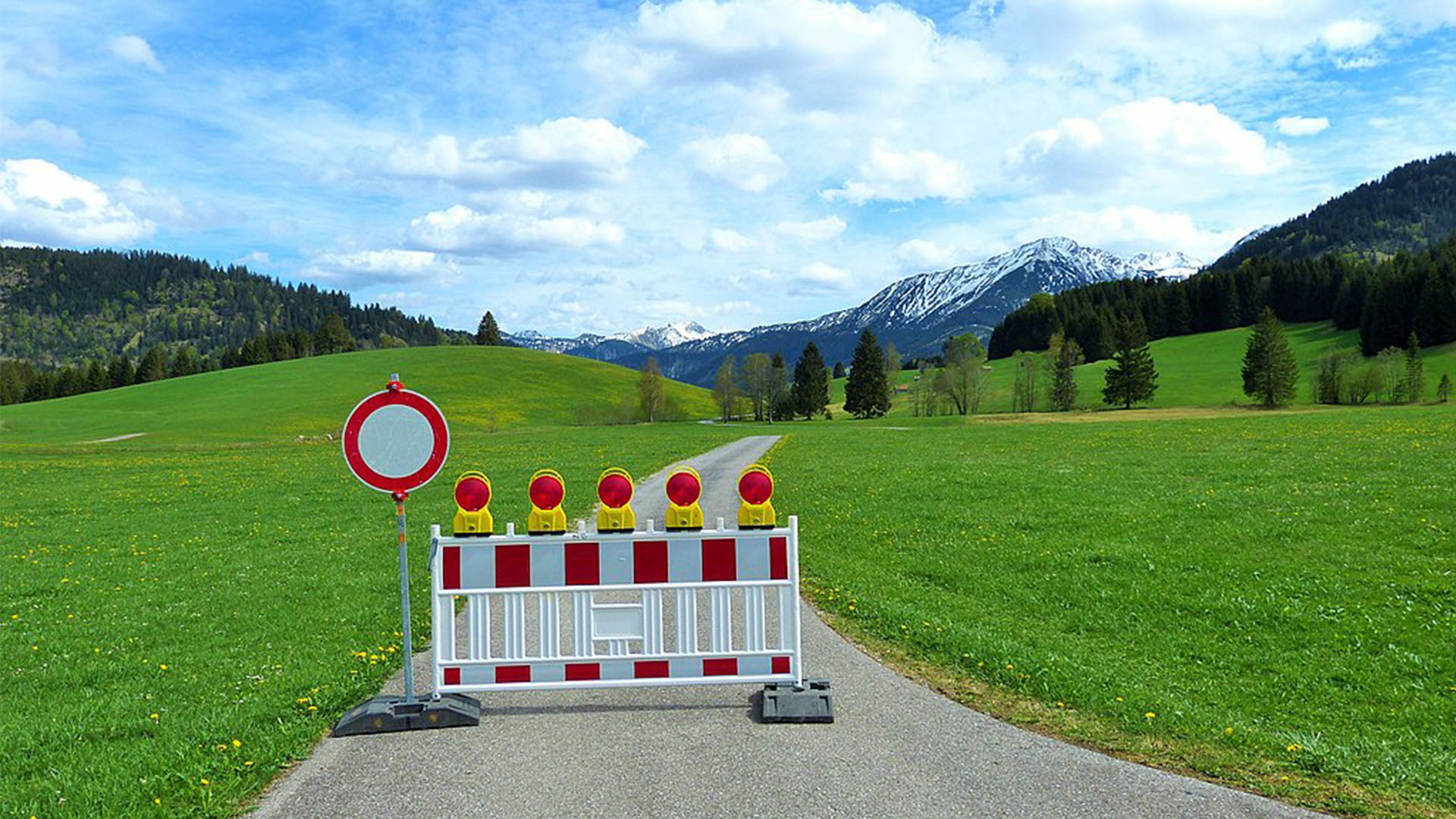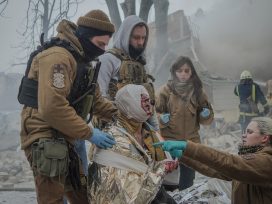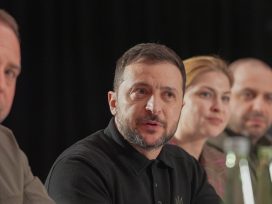There is no monopoly on common sense
On either side of the political fence
We share the same biology, regardless of ideology
Believe me when I say to you
I hope the Russians love their children too
Sting, ‘Russians’, 1985
I was not yet 18 when I first heard Sting’s song Russians. It came out during the romantic years of perestroika, when many of us thought that the Cold War had ended and the world was heading towards universal brotherhood. I was slightly shocked to hear that some people in the West entertained doubts about Russians’ ability (all Soviets were Russians for them) to love their own children.
Having been witness to numerous conflicts in the post-perestroika world, I have since come to understand that if a political fence dividing groups of people and sometimes entire nations is high enough, it is not difficult to convince people on either side of it that those on the other side are not really human; that the others are evil, perfidious and dangerous creatures not worth talking to, and that it might be better if they do not exist at all.
When I was 18, fences were coming down all across Europe. They have since been rebuilt, and the dividing line is not so different. It is one between West and East. As Stephen Holmes and Ivan Krastev put it, after 1989 ‘confidence that the political economy of the West was a model for the future of mankind had been linked to the belief that western elites knew what they were doing’. After the financial and economic crisis of 2008, this illusion was shattered. Like Fukuyama’s ‘end of history’, ‘the end of communism’ was an ideology-driven project of global transformation that was unrealistic from the very beginning.
But there are other factors that contributed to the re-emergence of the East–West split. At the beginning of the 1990s, the global leadership of the West appeared unassailable. Only a decade later, it became clear that western dominance could be threatened not only by new challengers, like rising China or Islamic radicals, but by grave mistakes made by the West itself.
At the time, European integration seemed to be a highly successful project. The Maastricht Treaty signed in 1992 transformed the European Community into the European Union and 15 years later the EU incorporated central and eastern Europe, the former satellites of the USSR. The western approach towards integration appeared to be a kind of a reversed Marxism: including CEE into the common market would supposedly transform former communist nations into prosperous liberal democracies. This was another great illusion.
Communism or, more precisely, Soviet-style socialism was a strange phenomenon. It could be described, at least in the beginning, as a project of revolutionary modernization, albeit very wasteful and cruel. Even the modernization it offered proved superficial, and certainly not profound enough to change the intrinsically conservative mindset of eastern European societies. Indeed, communism appears to have preserved many archaic social forms and habits.
When Milan Kundera called Central Europe the ‘kidnapped West’, he did not realize the extent of this ‘freezing’ effect and the differences it caused between the two parts of Europe. After the fall of the Iron Curtain, these became apparent. Kundera was far from alone; hardly anybody understood this legacy in the euphoric autumn of 1989.
Mutual disappointments
For most CEE inhabitants, the fall of communism was not only a rush from dictatorship towards democracy. It was also a move from the unenviable status of Soviet semi-colonies to the restoration of independent nations. ‘Back to Europe’ meant ‘away from the USSR’. That is why democracy, a political symbol of the return to Europe, was for many citizens of former Soviet countries not only liberal but also national. The main political clash of the post-communist CEE was between those who emphasized the liberal side of democracy and those who preferred nationalism to ‘cosmopolitan’ liberalism.
Until a large group of CEE countries joined the EU in 2004 and 2007, this conflict was not so evident. Although the institutional and ideological frame of ‘returning to Europe’ was provided by liberal Brussels, joining the EU was a priority for all the main political forces in CEE. That is why all of them – liberals, conservatives, communists-turned-socialists – loudly proclaimed their ‘Europeanness’. The situation rapidly changed when these former provinces of the Soviet empire received formal confirmation that they were now truly a part of Europe.
A couple of years later, the global recession hit Europe, giving rise to massive internal tensions that threatened to tear the EU apart. That was not to happen. But the eurozone crisis of 2010–13 and, even more, the migration crisis of 2015 created deep fissures inside the Union. The romance that had begun in 1989 was over. ‘Old’ and ‘new’ Europe were both visibly disappointed.
Western Europeans, or rather their political elites, are usually disappointed with what they perceive as the ‘immaturity’ of CEE nations, their rampant corruption, their neglect of legality and order (often exaggerated), their conservatism, their hostility towards minorities, and their lack of ‘ecological consciousness’. Today’s Polish and Hungarian governments, led by national conservatives, represent all these vices. The common market did not help much in making ‘old’ and ‘new’ Europeans converge. On the contrary: the ‘Polish plumber’ became a symbol of cheap labour from the East allegedly depriving western locals of jobs. It was little surprise that one of the main promises of the Brexit campaigners in 2016 was that they would stop this kind of immigration to the UK.
But the East is disappointed too. First, it does not think of itself as an inferior or underdeveloped part of Europe, but as ‘another Europe’, one whose historical experience was different, more turbulent and often more tragic, and which for that reason deserves more attention and respect. Second, dreams of becoming almost as wealthy as the West did not come true, although European integration has largely been a success story for CEE economies – about half of ‘new’ EU members have already exceeded the poorest ‘old’ ones, Greece and Portugal, in terms of GDP per capita. Nevertheless, mass economic migration to the West helps reinforce inferiority complexes.
CEE nations are not reconciled to being treated as ‘poor relatives’. Clotilde Armand, a Bucharest-based, French MEP representing Romania expresses the issue succinctly when she argues that
much of the wealth in Europe flows from poorer countries to richer ones – not the other way around. Start with the brain drain. Europe’s periphery is haemorrhaging young bright workers whose education was paid for by taxpayers in their home countries. The profits western European companies make in central and eastern Europe far outstrip the public funding that is transferred to the east. At home in Bucharest, I shop in a French-owned supermarket, and my phone operator and my water company are French. I pay my gas bill to a French multinational, through a French bank of course.
Between unity and division
Yet tensions between western Europe and CEE do not look insurmountable. During the past thirty years, ‘old’ and ‘new’ Europe have created a tight web of economic, political, cultural and personal connections. Today’s Europe is simultaneously more united and more divided. Both cooperation and mutual distrust are interwoven into the complex relationship between the west and east of the EU.
This paradoxical situation has its negative sides. While criticizing CEE governments for their shortcomings in maintaining the rule of law and in abiding by the rules of democracy, Brussels generously supports them with EU subsidies. It is no secret that a vast part of these funds, even if not directly stolen, goes to local oligarchies with close connections to the ruling populist parties, such as PiS in Poland, Fidesz in Hungary and ANO in the Czech Republic.
In case of emergencies, CEE populists ‘repay their debts’ with political favours. On 16 July 2019, Ursula von der Leyen was elected President of the European Commission by 383 MEP votes, just nine more than what she needed. Eleven Hungarian MEPs representing Fidesz obediently supported her candidacy, at a time when Fidesz has been threatened with exclusion from the European People’s Party (to which both Fidesz and Ursula von der Leyen’s CDU continue to belong).
There is also ideological convergence between East and West. Since the migration crisis of 2015, the European mainstream has moved significantly to the right. The reactions of European leaders such as von der Leyen, or European Council President Charles Michel, during the crisis at the Greek–Turkish border in February and March 2020, when thousands of refugees tried to enter Europe, sounded more like Orbán than Angela Merkel. On the other hand, ecological activism and concerns about a ‘green economy’ are now becoming parts of CEE’s political agenda, just as they have in western Europe.
Populism, one of most ‘fashionable’ topics for liberal analysts, appears to be a much more limited threat to European stability than some alarmists would have us believe. The 2019 European Parliament elections did not bring any real breakthrough for national populists, although some populist forces, like Matteo Salvini’s League in Italy, did achieve local successes. Instead, green parties have emerged as the most attractive choice for younger voters, although there continues to be a significant difference between western European and CEE countries in this respect.
The key issue is that populist nationalism and Euroscepticism are defensive positions in today’s Europe. They lack real ideological drive and, unlike fascism and communism in the first half of the twentieth century, do not offer any radical or utopian project of social reorganization or ‘rejuvenation’.
This is not to say that Hungary’s Fidesz, Italy’s League or Alternative for Germany are mainstream political parties that now belong to the democratic political game – on the contrary, especially when it comes to Orbán’s decade-long rule in Hungary, which could be described as a kind of ‘Putinism-light’. Nevertheless, none of these groupings look like a true revolutionary force ready to overthrow democratic rule and establish an alternative political system. Even Orbán appears to be too much of a realist to pursue his fantasies about ‘illiberal democracy’ that far.
For now, external challenges pose a greater threat to the stability of Europe. Look at the COVID-19 epidemic: a disaster that ought to have prompted a timely, quick and coordinated response. But there was no one. Instead, Europe – and that goes for both the EU institutions and national governments – was entirely unprepared. Quarantines, cancellation of flights and closure of borders were all done spontaneously by individual countries. Its failure to sufficiently help the worst-affected countries, Italy and Spain, made the impression of the EU’s impotence and incompetence even worse.
These early errors were at least partly corrected later in the crisis. Brussels adopted a formidable program of financial help to member countries and, taking into account how severe the economic consequences of the epidemic are likely to be, abolished some budget limitations. We have seen inspiring examples of European solidarity, including patients from Italy and France taken to German hospitals, and the European Union sending medical devices and protective equipment to Spain, Italy and a number of CEE member states. Nevertheless, the damage had been done. The EU was not visible enough and there was even talk of Chinese and Russian aid to Italy outweighing that of the Union.
The controversies surrounding the European Recovery Fund again reflect both the vulnerability of the EU edifice and the fissures between member states. The fund emerged from a joint Franco-German proposal and has a clear agenda: greater fiscal integration and solidarity with countries like Italy and Spain. The ERF plan has met with resistance from western European and CEE countries. The so-called ‘frugal four’ (Austria, Denmark, Finland, Netherlands) are not happy that 500 billion euros from a 750 billion euro recovery fund will be given to EU members as grants, and the rest as credit. But they do not criticize the principles of solidarity and European coherence on which ERF is based.
CEE countries resist the idea for different reasons. Some are simply afraid of the possible redistribution of funds inside the EU. As Tadeusz Koscinski, Poland’s finance minister, told The Financial Times, ‘any funding for the COVID response should be additional. We shouldn’t be touching what’s already been agreed.’ Others, like Czech prime minister Andrej Babiš, reject the plan as an injustice. His country, he claimed, had coped with the epidemic relatively well and should not be deprived of additional money from the European purse because the Italians and Spanish ‘let their health care systems fail’.
The European Commission has said that all the recovery programs should be implemented within the framework of the European Green Deal: ‘We must repair the short-term damage from the crisis in a way that also invests in our long-term future.’ This is a problem for some conservative and populist political forces across Europe: they consider the European Green Deal to be a purely ideological project which could ruin the European economy. Taking into account all these factors, it is hard to not to suspect that the this will be a difficult decade for Europe.
Russian grievances
The COVID-19 crisis will pass. But other external threats facing Europe will definitely not. One is Putin’s Russia, which continues to look for ways to expand its ‘sphere of influence’ along the EU’s eastern border.
The problem has been around for much longer than commonly assumed. It emerged at the latest in 1999, when NATO attacked Serbia in order to prevent further ethnic cleansing in Kosovo. Russia, which had not been consulted, interpreted the attack on its historical Balkan ally as a hostile act. Other diplomatic conflicts emerged soon after: Russia (at the time in a tactical alliance with Germany and France) denounced the US invasion of Iraq in 2003; a year later it accused the West of supporting anti-Russian forces during the ‘Orange Revolution’ in Ukraine.
In his famous speech at the Munich security conference in February 2007, Vladimir Putin warned the US and its allies against ‘meddling’ in Russia’s affairs, including the Russian sphere of ‘vital interests’. In 2008, Russia and Georgia fought a short war over two Georgian separatist territories turned Russian protectorates (in which the US and the EU preferred not to take sides openly). Six years later, another Ukrainian crisis erupted; Russia’s annexation of Crimea was followed by western sanctions. The relationship has not improved much since and even worsened after the Salisbury poisonings.
This sequence of events is sometimes interpreted as evidence of Russia’s intrinsic expansionism and Putin’s desire to restore the USSR or the Russian Empire in a modernized form, or at least to spread the Russian influence far beyond the borders of the Russian Federation. The second option is partly true, but the Russian perception of today’s conflict with the West is different.
For many Russians, the current borders of their country, as they have existed since the fall of the USSR in 1991, are justified neither historically nor ethnically (there are millions of ethnic Russians living in other former Soviet republics), and therefore not really legitimate. The ruling elite, and many ordinary Russians, tend to look at their neighbours, especially Ukraine and Belarus, as a legitimate sphere of Russian political, economic and cultural influence (Putin likes to speak of Russians, Ukrainians and Belarusians as ‘basically the same nation’).
While no longer a superpower, Russia is still a leading global player with interests in various, even very distant parts of the world. Putin has tried to assert this status through his military operation in Syria, by sending mercenaries to a number of African countries, and by maintaining close ties with regimes such as that of Hugo Chávez and his successor Nicolas Maduro in Venezuela.
Over the past two decades the West has, in Putin’s view, been trying to push Russia into a corner. That is why the annexation of Crimea and the provocation of a bloody war in the east of Ukraine are not seen in Russia as acts of Russian aggression but defensive measures taken as a response to the western-backed coup d’état in Kyiv in February 2014 against Viktor Yanukovych, pro-Russian President of Ukraine.
Even some liberal Russian voices, while disagreeing with the official version of the Russia–West relationship, put at least part of the responsibility for the current situation at the door of western politicians. Ivan Kurilla, a liberal Russian historian, believes that the world would look much better if the West had not made so many mistakes in its Russia policy from the end of the Cold War onward:
If Russia was to be treated as a defeated power, did this approach not contrast from the widespread understanding of the importance of integrating Germany and then the rest of Europe in the 1950s? Furthermore, is it not this very triumphalism which now feeds the rising revanchism in Russian society and its support for the current regime’s desire to reassess and replay the end of the Cold War?
Taking this into account certainly does not mean agreeing with the official Russian interpretations of the post-Cold War period. It is to point out that resentment towards the West is the prevailing emotion in Russian ruling circles today, and that this resentment has two rather obvious sources. First, there is the refusal of the West to play Putin’s game, i.e. to reach an agreement with the Kremlin that some call ‘Yalta 2.0’ – establishing spheres of influence in eastern Europe, the southern Caucasus and possibly Central Asia.
The second reason is even simpler: by keeping Russians in a state of permanent mobilization against ‘hostile encirclement’ of their country, Putin’s regime distracts attention from multiple internal problems – rampant corruption, outrageous levels of inequality, economic stagnation, and so on. Earlier this year, the regime found a ‘legal’ way to perpetuate Putin’s rule even further into the future, introducing constitutional amendments that give him the right to run for president at least two more times after his current presidential term, which ends in 2024.
It is evident that a détente with the West is not in the interests of Putin and his entourage. The Kremlin’s foreign policy is based on constant manoeuvrings in search of any cleavage between ‘our dear western partners’, as Putin likes to say with his foxy irony. ‘Pipeline diplomacy’ is highly useful in this respect (North Stream 2 being the best example), and so are shadowy activities like supporting hacker groups oriented at meddling in the political processes of other countries, sending paramilitaries to places like Syria and Libya, and so on.
Returning to a regular dialogue with Russia on the official level is likely to become possible again only after departure of Putin and key representatives of his long rule. But that does not mean that a dialogue with Russian society is impossible for now. Despite the obstacles, there is hardly any cultural split between Russia and the West. According to recent polls, the share of Russians with positive attitudes towards the EU and the US has been growing despite the best efforts of Kremlin propaganda, reaching 49 and 42 percent respectively (37 and 46 percent of respondents described their attitude as ‘bad’ or ‘relatively bad’).
Just as in the much more optimistic times 35 years ago, Russians still do not want wars or other disasters and still love their children. Many are ready to look at those standing on the other side of the political fence as their partners and potential friends. The problem is that the interests of Putin’s regime are in conflict with those of these Russian people too. And, as we learned during the last century, the problems of Russia are often those of the whole world.








